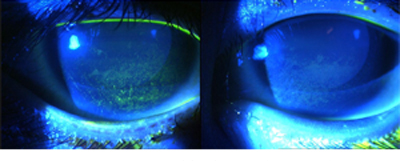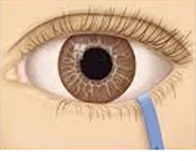ENQUIRY FORM
Dry Eyes
What is dry eye syndrome?
Healthy eyes are lubricated with tears. Normally, a film of tears exists on the surface of the eyes. Dry Eyes can occur when
- your eyes do not produce enough tears
- normal tear flow is interrupted
- tears drain away too quickly
- there is an alteration of tear film layers due to disrupted production of tear film components
Tears are essential for maintaining the health of the front surface of the eye (the "cornea"), protecting it against infection, and keeping our eyes comfortable with clear vision.
What are lubricating tears?
Each time we blink, lubricating tears flow from the tear glands in the upper eyelid over the surface of the eye. Lubricating tears keep our eyes moist and comfortable.
What are reflex tears? Why do I tear even though my eyes feel dry?
Reflex tears are produced in response to noxious stimulants eg: a dry environment. They are also produced when you cry. Reflex tears are different from lubricating tears – they do not soothe dry eyes. So even if your dry eyes start to water, the watering does not relieve the dryness
If you have one or more of these symptoms, it is possible you may have dry eyes:
- Eye redness
- Dryness
- Blurred vision which clears with every blink
- Itchiness
- Burning or stinging sensation
- Sensitivity to bright light ("photophobia")
- Scratchiness, grittiness or a "foreign body" sensation
- Seeing haloes around lights
- Intolerance to wind, smoke, cold dry environments
- Excessive tearing
Am I at risk of dry eye?
Dry eyes can result from many causes, including:
- Ageing
- Medical conditions like rheumatoid arthritis, diabetes
- Contact lens wear
- Refractive surgery eg: LASIK, PRK
- Cataract surgery
- Medications like anti-histamines, oral contraceptives, anti-depressants, isotretinoin-type drugs for treatment of acne
- Eyelid problems such as eye lash follicle infections, lid margin oil gland inflammation
- Environmental factors eg: smoke, haze, dry climates, wind, air-conditioned rooms
How is dry eye diagnosed?
Besides symptoms suggestive of dry eyes, clinical examination of the tear film may identify dry spots on the surface of the eye.
Tear production can be quantified with a Schirmer's test. This involves inserting a tiny filter paper in the lower eyelid for 5 minutes, and reading off from a scale on the filter paper corresponding to the amount of tears soaked up by the paper.
 DRY SPOTS DEMONSTRATED ON FLORESCEIN DYE STAINING |
 SCHIRMER'S TEST |
How is dry eye treated?
Supplementing tears
Artificial tears or lubricating eye drops are the most common treatment for dry eyes. These help by supplementing natural tears. Preservative-free artificial tears are recommended for people with more severe dry eyes needing frequent application of drops as these do not contain additives which could irritate the eyes. For very dry eyes, a gel- or ointment-based lubricant may be prescribed.
Conserving tears
If lubricating eye drops are not helping, closure of the tear duct opening (called the "punctum", located at the nasal corner of the lower eyelid) may help. Punctal occlusion keeps tears longer in our eyes by preventing drainage down the tear duct. This may be performed by inserting a tiny silicone plug into the punctal opening (reversible) or by cauterising the punctum to close it (irreversible).
Improving the quality or production of the tears
Nutritional supplements containing omega-3 fatty acids can relieve the symptoms of dry eyes in many patients. An FDA-approved eye drop for dry eyes called Restasis can be prescribed in moderate to severe dry eyes. It works by increasing tear production via suppression of inflammation of the tear glands commonly occurring in dry eyes.
Treating the underlying causes
Eyelid diseases eg: inflammation of the oil glands ("meibomianitis"), infection of the eye lash follicles ("blepharitis") can cause dry eyes. Treatment with lid cleaning, warm compresses, antibiotic ointments can alleviate dry eye symptoms. Avoidance of medications known to cause dry eyes can reverse symptoms.

